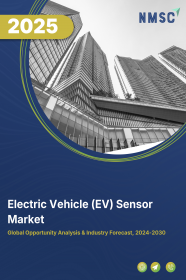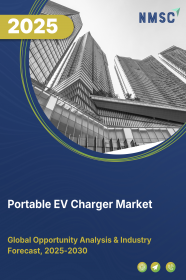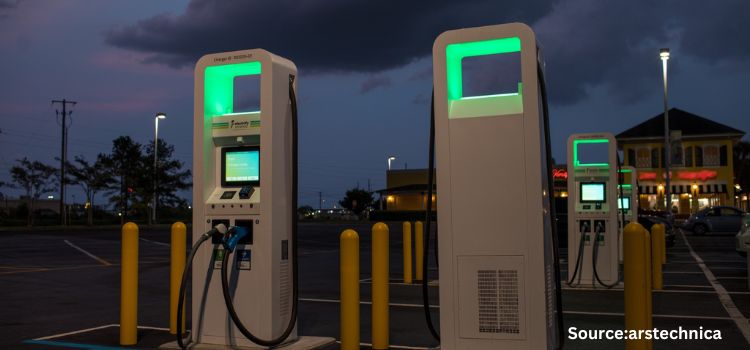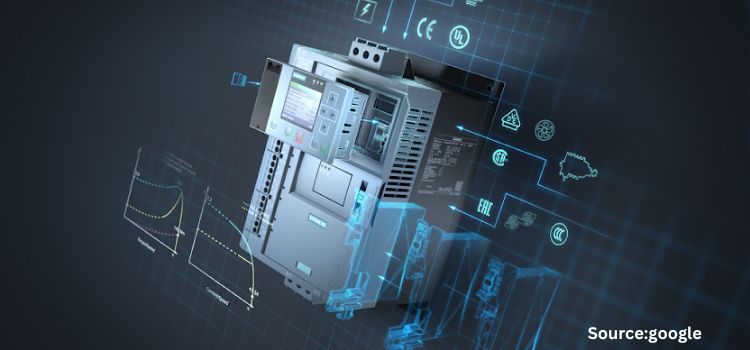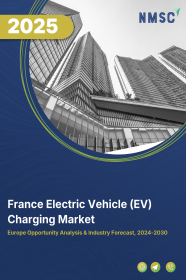
France Electric Vehicle (EV) Charging Market by Type of Charger (AC Chargers, DC Chargers), by Charging Speed (Level 1, Level 2, Level 3), by Connector Type (J1772 (Type 1), Mennekes (Type 2), CCS (Combined Charging System), CHAdeMO, Others), by Charging Modes (Mode 1, Mode 2, Mode 3, Mode 4), by Installation (Fixed, Portable), by End User (Commercial, Residential) – Opportunity Analysis and Industry Forecast 2023–2030
Industry: Automotive & Transportation | Publish Date: 15-Jan-2025 | No of Pages: 153 | No. of Tables: 116 | No. of Figures: 61 | Format: PDF | Report Code : AT851
Market Definition
France Electric Vehicle (EV) Charging Market was valued at USD 565.84 million in 2022, and is predicted to reach USD 4559.6 million by 2030, with a CAGR of 30.5% from 2023 to 2030. Electric vehicle chargers are defined by the amount of energy delivered to the vehicle’s battery per unit of time. It is an infrastructure that is used to connect the plug-in electric vehicle to an electrical outlet to charge the battery of the vehicle. Electric vehicle chargers are used to provide charging to EVs with a battery and the electrical source that helps to charge the battery.
Electric vehicles, neighborhood EVs, and plug-in hybrids can all be charged at a charging station by connecting to an electrical source. Advanced features including smart meters, cellular connectivity, and network access are available on some charging stations.
The charging of EVs can be carried out through several levels of charging such as level 1, level 2, and level 3. The higher the level of charging, the faster the charging process causing more power to be delivered to the vehicle. The use of electric vehicles significantly reduces the carbon footprints released into the atmosphere, which contain toxic gas. The growing threat of carbon emissions and other harmful gases stemming from transportation has triggered the vital necessity of adopting electric vehicles.
In addition, the penetration of EV charging is high in commercial spaces as compared to residential ones. Long-distance trips would benefit from ultra-fast charging capabilities made possible by public charging infrastructure. However, EV chargers for residential spaces offer significant growth potential as they are affordable and more convenient for charging electric vehicles as compared to commercial charging stations.
Government Support and Policies Drive the Growth of EV Charging Market in France
The favourable government policies, funds, and support to initiate EV charging in France is one of the vital factors that boost the growth of the market. For instance, the French government announced to provide USD 113 million funding programme to support the installation of fast charging stations for electric cars. This will support the companies to invest in electric vehicle (EV) charging stations in service areas located along public motorways and the national road network to install at least 4 fast charging places, including two 150 kW stations.
Surging EV Adoption in France Driven by Environmental Awareness Fuels EV Charging Market Growth
The substantial rise of electric vehicles (EVs) in France can be credited to a growing awareness of environmental concerns among the French people. More and more individuals are recognizing the environmental impact of traditional gasoline cars, leading to a notable shift toward electric mobility. This heightened environmental consciousness is driving a significant increase in EV adoption as consumers seek cleaner and more sustainable transportation options.
Consequently, the increased demand for EVs has created an urgent need for a well-established and accessible EV charging infrastructure. This, in turn, is fuelling the growth of the EV charging market in France. The close relationship between environmental awareness and EV adoption highlights the influential role of public sentiment in shaping the future of sustainable transportation in the country. According to ICCT, approximately 470,000 electric vehicles were sold in 2020, further driving the demand for the EV charging market in France.
Fast Chargers' High Initial Setup Costs Hinder The Ev Charging Market Growth
The growth of the EV charger installation sector faces potential obstacles due to the lack of incentives and concerns over high installation costs. One of the primary hindrances to its expansion is the substantial initial expense associated with level 3 and ultra-fast chargers. Unlike the swift 5 to 7-minute refuelling experience for traditional fossil fuel vehicles, level 1 and level 2 chargers can take anywhere from 6 to 16 hours for a full charge.
As a result, there is a strong market demand for fast chargers capable of recharging EVs in under 30 minutes. However, the initially higher cost of level 3 charging stations might dissuade those considering the transition to EVs, particularly because extended charging times could disrupt their already busy schedules. These challenges underscore the importance of addressing cost and charging speed concerns to further promote the adoption of electric vehicles and the growth of the charging infrastructure sector.
Surging Adoption of Vehicle-to-Grid (V2G) EV Charging Stations in France Unlocks Promising Opportunities
A technology called vehicle-to-grid (V2G) EV charging allows plug-in EVs and the power grid to exchange electrical energy in both directions. Electric vehicles (EVs) can store extra electricity and release it to the grid thanks to V2G technology. This may enhance the functionality of the electrical component and increase value for EV owners.
The development of this concept has made charging for electric vehicles easier, and EVs are now among people's top transportation options. As a result, the entire market for charging stations is essential for connecting the electric vehicle to the grid and enabling the vehicle to charge.
Two V2G EV vehicle charging stations were erected by Enel Energia S.p.A. at the Italian Institute of Technology's Genoa headquarters. The installation is a part of MOV-E, a Nissan-sponsored corporate electric car sharing trial project. The Italian Institute of Technology received two battery electric vehicles (LEAF models) from Nissan as well as the Glide app management platform. The partnership between Enel and Nissan represents a shift in the way that technology is used for sustainable transportation.
As a result, manufacturers have a great chance with the V2G charging technology because it is predicted to change the EV industry and determine how EVs will be charged in the future. Although V2G infrastructure is more beneficial than smart charging, installing V2G charging stations has a hefty up-front cost. Manufacturers of EV connectors are projected to have opportunities to produce sophisticated connectors to withstand electrical architecture due to the predictable and anticipated expansion of V2G technology.
Competitive Landscape
The France Electric Vehicle (EV) Charging industry includes several market players such as Tesla Inc., ChargePoint Holdings Inc., ABB Ltd., Allego B.V., Shell Plc, ChargeNow by BMW, WallBox Inc., EVBox, Schneider Electric, Siemens, Virta Global, Premier Farnell Limited, TotalEnergies, IONITY GmbH, Atlante Ltd., and Hyundai Motor Company.
Key Benefits
-
The France Electric Vehicle (EV) Charging market report provides a quantitative analysis of the current market and estimations through 2023-2030 that assists in identifying the prevailing market opportunities to capitalize on.
-
The study comprises a deep dive analysis of the market trend including the current and future trends for depicting the prevalent investment pockets in the market.
-
The information related to key drivers, restraints, and opportunities and their impact on the market is provided in the report.
-
The competitive analysis of the market players along with their market share in the France Electric Vehicle (EV) Charging market.
-
The SWOT analysis and Porter’s Five Forces model are elaborated in the study.
-
Value chain analysis in the market study provides a clear picture of the stakeholders’ roles.
France Electric Vehicle (EV) Charging Market Key Segments
By Type of Charger
-
AC Chargers
-
DC Chargers
By Charging Speed
-
Level 1
-
Level 2
-
Level 3
By Connector Type
-
J1772 (Type 1)
-
Mennekes (Type 2)
-
CCS (Combined Charging System)
-
CHAdeMO
-
Others
By Charging Modes
-
Mode 1
-
Mode 2
-
Mode 3
-
Mode 4
By Installation
-
Fixed
-
Portable
By End User
-
Commercial
-
Commercial Public EV Charging Stations
-
Highway Charging Stations
-
Fleet Charging Stations
-
Workplace Charging Stations
-
-
Commercial Private EV Charging Stations
-
-
Residential
Key Players
-
Tesla Inc.
-
ChargePoint Holdings Inc.
-
ABB Ltd.
-
Allego B.V.
-
Shell Plc
-
ChargeNow by BMW
-
WallBox Inc.
-
EVBox
-
Schneider Electric
-
Siemens
-
Virta Global
-
Premier Farnell Limited
-
TotalEnergies
-
IONITY GmbH
-
Atlante Ltd.
REPORT SCOPE AND SEGMENTATION:
|
Parameters |
Details |
|
Market Size in 2022 |
USD 565.84 Million |
|
Market Volume in 2022 |
54 Thousand Units |
|
Revenue Forecast in 2030 |
USD 4559.6 Million |
|
Growth Rate |
CAGR of 30.5% from 2023 to 2030 |
|
Analysis Period |
2022–2030 |
|
Base Year Considered |
2022 |
|
Forecast Period |
2023–2030 |
|
Market Size Estimation |
Million (USD) |
|
Growth Factors |
Awareness of environmental concerns. The increasing government initiatives. |
|
Companies Profiled |
10 |
|
Market Share |
Available for 10 companies |
|
Customization Scope |
Free customization (equivalent up to 80 working hours of analysts) after purchase. Addition or alteration to country, regional, and segment scope. |
|
Pricing and Purchase Options |
Avail customized purchase options to meet your exact research needs. |

















 Speak to Our Analyst
Speak to Our Analyst



